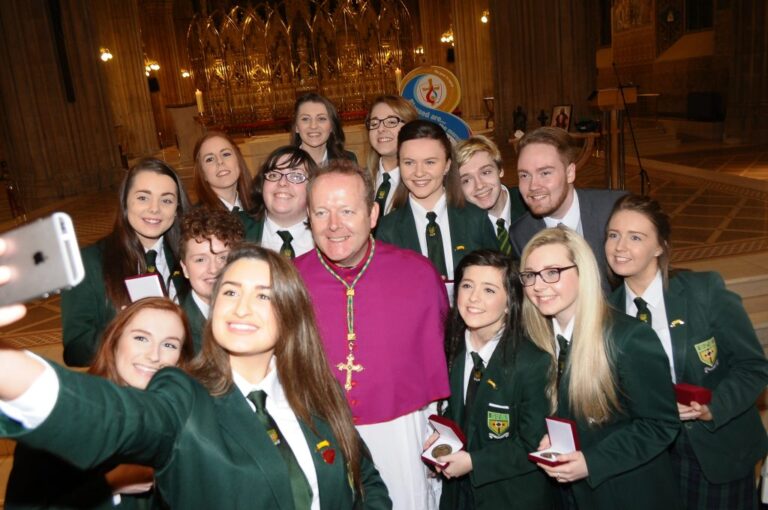The Archdiocese of Armagh accommodates 242,860 Catholics and covers County Louth, most of County Armagh and part of counties Tyrone, Derry and Meath. Eamon Martin was appointed archbishop of the diocese in January 2013.
1,500 people responded to the questions posed by the Diocesan Synodal Core Group and the Archdiocese acknowledged that most responses seemed to come from those already engaged with Church at some level. It is noteworthy that peripheral and marginalised voices emerged mainly from the one hundred and sixty online responses and the five hundred responses from young people.
Love for the Church and a continuing belief in God
From the responses and from the experience of the diocesan synodal moment, love for the Church and a strong belief in God still clearly exists.
Commitment to preventing abuse and its trauma
The participants revealed that a deep hurt that exists around sexual and institutional abuse and the diocese reaffirmed its commitment to its safeguarding procedures to help prevent abuse inside and outside the Church. The task of accompanying survivors in the process of reconciliation and healing shall was regarded as an integral part of the diocese’s ongoing synodal process.
Optimal celebration of Mass
Some respondents had a longing for the drama and mystery of the devotional practices of the past and they felt that something important was lost in the post Vatican II liturgical changes. What is clear from the submissions is that good liturgy is essential. Many communities throughout the diocese do try to enhance the quality of people’s participation in the Sunday Mass particularly where there are good choirs and strong lay involvement in the liturgies. One of the striking issues to arise was the reaffirmation of the importance of preaching, of linking the word to the lived experience of people. Many respondents felt that priests and deacons need to put more thought into the preparation of their homilies. Often, they were overly long, abstract, or simply a repeat of the gospel. Short homilies related to real life were always more effective and appreciated.
Creating lay-led roles and taking away burdens from priests
The over reliance on an ever-dwindling number of ageing clergy in the Church has left it lacking in the energy necessary for a new missionary impetus. Many priests are often tired and weary from doing the tasks that many in the lay faithful could do with the appropriate education and formation. Leaders must acknowledge the current situation and plan for the future in a more realistic way. They need to encourage parishes to have a missionary outlook. This will involve identifying what is essential for evangelisation and taking the difficult decisions needed to refocus on mission.
Limited structures for dialogue in the diocese
The submissions revealed that there is a deep reverence for the sacraments and the liturgical moments in Church life and yet these moments do not seem to generate or foster opportunities for dialogue, or conversations around faith, in the many communities across the diocese.
It was also felt by respondents that the Church is very outdated in its decision-making processes and only the views of a particular few are welcomed. There are no mechanisms within the diocese or in parishes to listen to the voice of those who have contrary views and as a result many have walked away.
The influence of authority in the Church
The Church both at a local and universal level was perceived by those who engaged in the process as very hierarchical. Most people do not feel that they have any meaningful say in how it is administered or in the decisions it makes. Even where lay people are involved on Pastoral Councils, Finance Committees, and Diocesan Committees there is a feeling that there are a select few who have always been involved and will not challenge the status quo.
Appreciation for priests and their ministry
For many of the respondents, the priests and deacons they knew in their own parishes were very open and welcoming. There was a deep appreciation of the important role the priest played in the local community and the pressure the priest was under in a time of declining numbers of clergy.
Concern for the ongoing welfare and care of clergy was expressed. If there was criticism it sprang for the most part from a desire to see the priest and deacon more involved in the community and freer to do the work of faith formation and development that they were ordained to do.
The Margins
Many people perceived that those who were not living within the limits of traditional morality, for example, those who were in a second relationship, had children outside of marriage or were from the LGBTQI+ community, were not welcome to participate in Church life. There was a call from some respondents for the Church to reassess its teaching on these matters. Young people felt that there was little done to make them feel part of the faith community, and women, though involved and committed in many ways, felt they were marginalised and had little say in the decisions that were made.
Additionally, respondents expressed their feelings of disappointment and hurt that the permanent diaconate and the priesthood were not open to women. They questioned how such a policy could be justified, practically or theologically, particularly in a time of falling vocations.
The full report from the Archdiocese of Armagh is available here.



